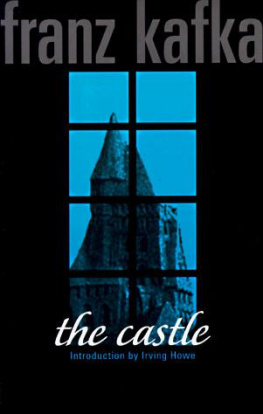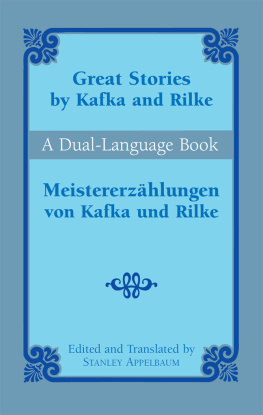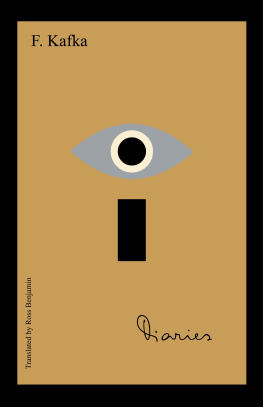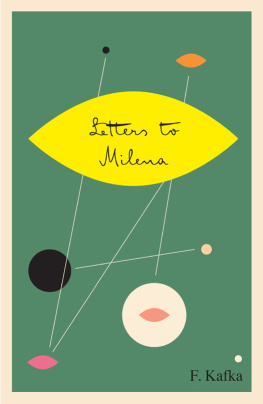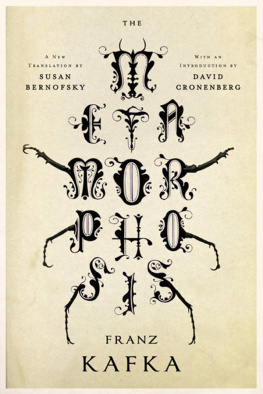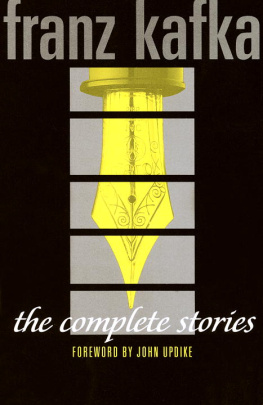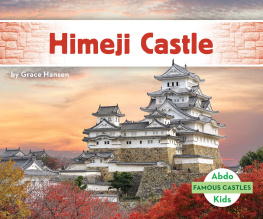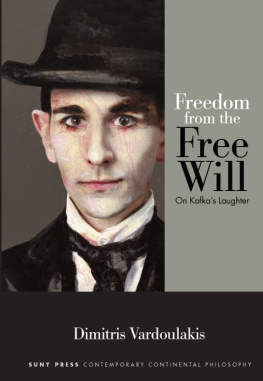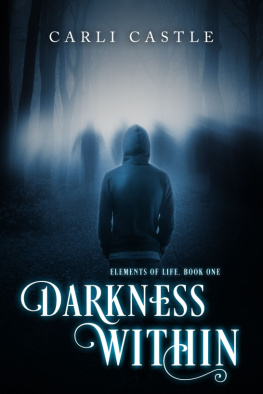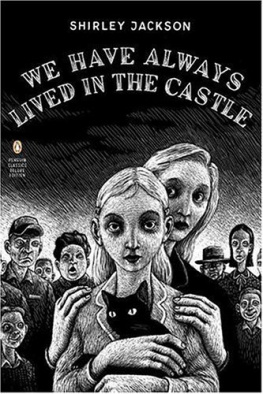"Kafka discovered the hitherto unknown possibilities of the novel, and it is thanks to him that the very notion of the novel is not the same as it was before." Milan Kundera
"He is the greatest German writer of our time. Such poets as Rilke or such novelists as Thomas Mann are dwarfs or plaster saints in comparison with him." Vladimir Nabokov VINTAGE CLASSICS
A study of relationships, particularly between the individual and society and between thought and action, The Castle is one of Kafka's most profoundly imaginative works. As fear and worry develop in a series of strangely illogical events and man's quest for freedom heightens, this classic novel confirms Kafka's reputation as one of the greatest creators of visionary fiction this century.
ALSO BY FRANZ KAFKA
Fiction
Metamorphosis and Other Stories
Complete Short Stories
America
The Trial
Non-fiction
The Diaries of Franz Kafka
Letters to Felice
Letters to Milena
Franz Kafka THE CASTLE
TRANSLATED FROM THE GERMAN BY Willa and Edwin Muir
WITH ADDITIONAL MATERIAL TRANSLATED BY Eithne Wilkins and Ernst Kaiser
NOTE
"KAFKA'S name, so far as I can discover, is almost unknown to English readers. As he is considered by several of the best German critics to have been perhaps the most interesting writer of his generation, and at he is in some ways a strange and disconcerting genius, it has been suggested that a short introductory note should be provided for this book, the first of his to be translated into English." - This is the first paragraph of Edwin Muir's Introduction published in 1930 with the first English edition of The Castle (in his and Willa Muir's translation) and reprinted in all later editions. Hardly ever has the work of translators been so amply rewarded - and indeed on so large a scale of literary fame for the translated work that the quoted paragraph now reads like a historical curiosity.
In the time between the first publication of The Castle and the definitive edition, Franz Kafka, although still a "strange and disconcerting genius", had risen to the stature of a classic of modern literature. Merely to list the critical literature his work has evoked would probably mean compiling a book. In this situation, which in itself is the greatest tribute to the work of Franz Kafka's devoted friend and editor, Max Brod, and to his first English translators, the reader no longer requires the help offered to him by the Introduction and Editor's Note of the previous editions - the less so as, quite apart from much other literature on the subject, Max Brod's biography of Franz Kafka has in the meantime become available in English translation.
However, as The Castle remains unfinished, the following paragraph from the Editor's Note to the first edition should be preserved : 'Kafka never wrote the concluding chapter. But he told me about it once when I asked him how the novel was to end. The ostensible Land Surveyor was to find partial satisfaction at least. He was not to relax in his struggle, but was to die worn out by it. Round his death-bed the villagers were to assemble, and from the Castle itself the word was to come that though K.'s legal claim to live in the village was not valid, yet, taking certain auxiliary circumstances into account, he was to be permitted to live and work there.' It is also not unimportant to know 'that The Castle seems to have been begun as a story in the first person, the earlier chapters being altered by the author, "K." being inserted everywhere in the place of "I", and the later chapters written straight out in the third person. In his postscript to the third German edition Max Brod gratefully acknowledges the editorial assistance of Heinz Pollitzer.
The present English edition is based on the definitive German edition of Das Schloss, S. Fischer Verlag, Frankfurt am Main, 1951* Lizenzausgabe von Schocken Books, New York.
Thus it is considerably larger than the previous editions which followed the text of the first German publication of the novel. The additions - result of Max Brod's later editing of Franz Kafka's posthumous writings - are the concluding section of chapter 18 and the whole of chapters 19 and 20. As the original translators of the novel were unable to undertake the translation of the new material, Eidine Wilkins and Ernst Kaiser kindly agreed to complete the work begun by Willa and Edwin Muir. The translators of the additional material have chosen "Mayor" rather than "Superintendent" as a translation of the German Gemeindevorsteher. The difficulty is that there is no precise English equivalent of the tide of the elected head of a village community. "Clients" has been replaced throughout by "applicants". The Latin "diens" meant "one who is at the call of his patron", and "client" came to mean someone under the protection or patronage of another and, more specifically, one who employs the services of a legal adviser or advocate. The translators considered that "applicant" has a more authentic ring, since there is no question of any payment being made to the officials of the Castle.
*****************************************************************************************
*********************************
IT was late in the evening when K. arrived, The village was J. deep in snow. The Castle hill was hidden, veiled in mist and darkness, nor was there even a glimmer of light to show that a castle was there. On the wooden bridge leading from the main road to the village K. stood for a long time gazing into the illusory emptiness above him. Then he went on to find quarters for the night. The inn was still awake, and although the landlord could not provide a room and was upset by such a late and unexpected arrival, he was willing to let K. sleep on a bag of straw in the parlour. K. accepted the offer. Some peasants were still sitting over their beer, but he did not want to talk, and after himself fetching the bag of straw from the attic, lay down beside the stove. It was a warm corner, the peasants were quiet, and letting his weary eyes stray over them he soon fell asleep. But very shortly he was awakened. A young man dressed like a townsman, with the face of an actor, his eyes narrow and his eyebrows strongly marked, was standing beside him along with the landlord. The peasants were still in the room, and a few had turned their chairs round so as to see and hear better. The young man apologized very courteously for having awakened K., introducing himself as the son of the Castellan, and then said:
"This village belongs to the Castle, and whoever lives here or passes the night here does so in a manner of speaking in the Castle itself. Nobody may do that without the Count's permission. But you have no such permit, or at least you have produced none."
K. had half raised himself and now, smoothing down his hair and looking up at the two men, he said:
"What village is this I have wandered into? Is there a castle here?"
"Most certainly," replied the young man slowly, while here and there a head was shaken over K.'s remark, "the castle of my lord the Count West-west."
"And must one have a permit to sleep here?" asked K., as if he wished to assure himself that what he had heard was not a dream.
"One must have a permit," was the reply, and there was an ironical contempt for K. in the young man's gesture as he stretched out his arm and appealed to the others, "Or must one not have a permit?"
"Well, then, I'll have to go and get one," said K. yawning and pushing his blanket away as if to rise up.
"And from whom, pray?" asked the young man.
"From the Count," said K., "that's the only thing to be done."
"A permit from the Count in the middle of the night!" cried the young man, stepping back a pace.
"Is that impossible?" inquired K. coolly. "Then why did you waken me?"
Next page
